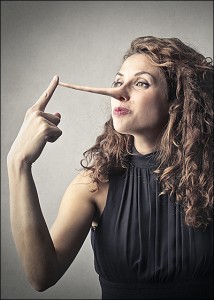Our Lying Culture
By Stephen Shepherd, Marketing –
I’ve been going to the gym a lot these days, but it seems I’m the only one that’s noticed a difference so far. Progression and growth occur by degrees. You’ve probably learned this if you’ve ever started working out, learned a new sport or musical instrument, or acquired a new skill. I read today that our destinies are not often formed by life-changing crises or events, but by our seemingly inconsequential daily decisions.
Lying is Universal… Right?
Now, keep this concept of small decisions in mind as we consider the following ― people lie. According to a study by the University of Massachusetts, 60 percent of adults lie at least once every 10 minutes in a conversation. Research estimates that we are lied to anywhere from 10-200 times daily! While most lies are not intended to hurt us, over time they can increase in intensity and ultimately modify the destiny of our lives or businesses.
How to Become a Liar
Deception occurs by degrees. A recent article describes six motives that push someone onto the slippery slope of lying: to protect the liar from danger; to protect others from danger; to enhance a story; to prevent embarrassment; to benefit a liar; or to hurt others. Clearly, not all these motives are inherently evil. Is is ever acceptable to lie? Those who justify lying “just once” put themselves at risk of slowly and gradually becoming habitual or compulsive liars.
Pamela Kulbarsh, a psychiatric nurse, suggests we ask ourselves the following questions before lying:
1) Would anyone be harmed if I was not completely truthful?
2) How would I feel if someone withheld the truth from me under the same circumstances?
3) Is avoiding the truth in the situation an act of cowardice or compassion?
Our ultimate decision in response to these questions will then set a precedent for future situations.
Human Lie Detectors ― Fact or Fiction?
Even though we personally control our own level of integrity, we remain influenced and surrounded by others that lie to us. For the most part, we don’t recognize when people are lying to our face. Studies indicate that human lie detection is only between 45-60 percent accurate. You might as well flip a coin to decide if someone’s being honest with you!
Without protection from deception, governments, corporations and other organizations could gradually fall into corruption. Deception detection technology has experienced monumental developments in recent years, making it more efficient and accurate. Investing in this technology is a step in the right direction to ensuring ethics in our organizations.


